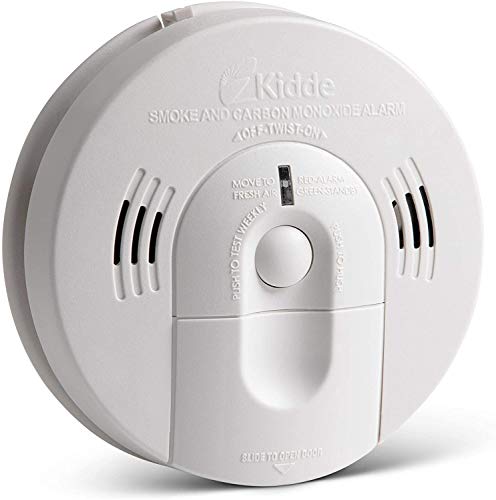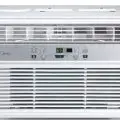Hey! This site is reader-supported and we earn commissions if you purchase products from retailers after clicking on a link from our site.
Just because something is unlikely to happen, it does not mean you should not prepare for it ahead of time. This statement is especially the case with the best RV carbon monoxide detectors. It is critical to have one for your RV, even if you know how careful you and your family are.
You never know what outside influences may do, after all. We took some time to pick out the best options for a carbon monoxide detector for your RV so you can breathe easy knowing you and your family will be safe.
Table of Contents
- Stay Safe With These RV Carbon Monoxide Detectors
- Reviews of Our Top Picks
- Recap: The Best RV Carbon Monoxide Detectors
- Buying a New Carbon Monoxide Detector: What to Look For
- FAQs (Frequently Asked Questions)
Stay Safe With These RV Carbon Monoxide Detectors
| Best RV Carbon Monoxide Detectors | Best For: |
| MTI Industries Carbon Monoxide Alarm | Versatility |
| Kidde Battery-Operated Carbon Monoxide Alarm | Durability |
| Atwood RV Carbon Monoxide Detector | Affordability |
| Safe-T Alert LP/CO Alarm | Hardwired Detector |
| First Alert Carbon Monoxide Alarm | Accuracy |
Reviews of Our Top Picks
Below are a ton of details, pros, and cons of all our top recommendations.
Most Versatile
MTI Industries Carbon Monoxide Alarm
Lacking a decent spot to put a carbon monoxide detector can be a pain. Luckily, this unit is super easy to set up and take down. Just stick it on a reasonably high surface, and you will be good to go.
Accuracy is no problem for MTI’s carbon monoxide detector. It is sensitive enough to pick up on subtle changes but can be a little too sensitive at times. Also, there is no way to turn it off quickly in case of a false alarm. However, those are easy to overlook and manage if you need something to work in several ways.
You do not have to worry about crazy weather changes setting this alarm off either. It can handle high and low temperatures with ease. Overall, this carbon monoxide detector is incredibly trustworthy and adaptable to various situations and setups.
Pros:
- Installation is a breeze
- Works for up to five years
- Mounts on the surface
- Trustworthy detection
- Temperature tolerant
Cons:
- Slight possibility of over-sensitivity and false alarms
- No plug for quick disconnection
Most Durable
Kidde Battery-Operated Carbon Monoxide Alarm
With an alarm loud enough to hear from quite a ways away, this carbon monoxide detector is ideal for those who are hard of hearing. The alarm will speak and tell you which one is going off, but that may not be a perk for some people. Regardless, the carbon monoxide detection capability is incredibly accurate.
An easy installation process allows you to set it up and forget about it. However, the batteries tend to run out more quickly than other models. If you tend to RV in locations with extreme temperatures, you may want to look elsewhere.
Even with these little quirks, this sensor’s ability to alert you of carbon monoxide is top-notch. Disregarding the unit’s variable battery life, this one will also last a long time, allowing you to have some peace of mind during your travels. The durability and sensitivity of Kidde’s carbon monoxide detector are unquestionable.
- 2 units in 1: unit alerts you to smoke & carbon monoxide by sounding a loud, 85-decibel alarm &...
- Ionization sensor technology senses invisible fire particles, while a electrochemical sensor detects...
- Voice Alarm & an 85-decibel alarm announces a hazard when detected: “Fire!” = smoke or fire or...
Last update on 2025-04-16 / Affiliate links / Images from Amazon Product Advertising API
Pros:
- Separate alarm sounds for smoke and carbon monoxide detection
- Accurate carbon monoxide detection
- Easy installation
- Perfect for those hard of hearing
Cons:
- Does not work as well for smoke detection
- Uses a fair amount of battery power
- Temperature-sensitive
Most Affordable
Atwood RV Carbon Monoxide Detector
The LCD screen that comes with this carbon monoxide detector lets you know even if the slightest change in levels occurs. The unique display allows you to monitor any increases, even if they do not set the alarm off. This way, you can keep an eye out for a rise in levels or address the problem before it gets worse.
Any change in carbon monoxide levels can signal that there is another problem somewhere. Early detection and how sensitive this detector will keep you on top of maintenance and leave you with peace of mind. You might have some trouble replacing the batteries when the time comes, but it is worth it.
Three types of lights signal different states of this carbon monoxide detector. All is well when green is blinking, but flashing red means an active alarm is going on. Lastly, a blinking red light indicates that the battery is on its last leg.
Pros:
- Digital display of CO detected
- Simple installation and good instructions
- Great detection capability
- Mounting plate included for easy positioning
Cons:
- The location of secured batteries is hard to reach
Best Hardwired Detector
Safe-T Alert LP/CO Alarm
As a hardwired RV co-detector, the Safe-T Alert deletes all the others of the equation. Installation is easy, especially for a sensor of this type. The alarms are loud, but there is a possibility of the occasional false alarm.
Since it detects carbon monoxide and gas leaks like propane, this unit is excellent for RV living especially. With all the generators and appliances plugged in, you never know what could be lurking in the air. It can also adapt to extreme temperature changes, no matter where your journey takes you next.
On top of all that, you will never have to replace the battery. All you will need to do is replace it every five years or so. Protection from this carbon monoxide detector is well worth the extra effort of placement. It is hardwired, after all, so it takes a little more than other models.
Pros:
- Uncomplicated instructions for installation
- Loud alarm to alert you from far away
- Up to five-year longevity
Cons:
- False alarms may occur
- Can be a little sensitive
Most Accurate
First Alert Carbon Monoxide Alarm
The First Alert carbon monoxide alarm is not only accurate, but it also has different colored lights and sounds depending on which alarm triggers. It is on the smaller side, and the lightweight design adds to the ease of installation. Also, the ability to detect smoke and dangerous gases is ideal for full-time RV living.
Even though the alarms have great features, the sounds might not travel through the whole space. Because of this, it could be useful to have a few set up in several locations. As long as you follow the easy guidelines to put it up, your RV will be that much safer in just a few minutes. Each type of alarm has exceptional accuracy to alert you of both smoke and carbon monoxide issues.
When the battery is low, and the chirping sound begins, there is a button to mute the sound for up to eight hours. This option gives you time to get a new battery and replace it without the headache of constant beeping while trying to go about your day. Being able to turn it off is especially helpful to RVers that cannot get somewhere to find a replacement battery right away.
- HIGHEST QUALITY, most accurate electrochemical co sensor technology
- CONVENIENT, end of life chirping signal
- HELPFUL, 2 silence features that silence both alarm and low-battery chirp
Last update on 2025-04-16 / Affiliate links / Images from Amazon Product Advertising API
Pros:
- Separate alarms for different alerts
- Straightforward directions for installing
- Lightweight
- Works well for all alarms
- Button for muting battery level chirping sound
Cons:
- Alarm volume may be low to some
Recap: The Best RV Carbon Monoxide Detectors
- MTI Industries Carbon Monoxide Alarm – Most Versatile
- Kidde Battery-Operated Carbon Monoxide Alarm – Most Durable
- Atwood RV Carbon Monoxide Detector – Most Affordable
- Safe-T Alert LP/CO Alarm – Best Hardwired Detector
- First Alert Carbon Monoxide Alarm – Most Accurate
Buying a New Carbon Monoxide Detector: What to Look For
When it comes to choosing an RV CO detector for your RV, there are some critical elements to consider. These components make up what your requirements should be and can vary in different situations.
The most important things to keep in mind are: how the detector will receive power, the level of detection, whether or not it has a smoke alarm, and if there is any additional useful information.
Power Source
Your setup will determine the type of carbon monoxide detector you need for your RV. A hardwired sensor will serve some better than others, and the same goes for battery-powered or plug-in units. Hardwired options do take a bit more work than the others, however. You may wish to investigate different RV Power Converters.
If you need a detector with versatility in placement, battery-powered plug-ins are your best bet. Hardwired sensors may require expert installation as well, which can be a hassle. However, they do not require battery replacement and are an excellent long-term investment. It is up to you to identify which model type will serve you best.
Level of Sensitivity
A carbon monoxide detector must have adequate sensitivity to detect increasing levels of the deadly gas. Without some sort of sensor, you risk carbon monoxide poisoning, which can be fatal. RV living proposes many situations where the invisible, odorless gas can accumulate and increase in levels fast.
Since there are ample opportunities for a carbon monoxide leak, you should have a detector in every room. If some sensors have more sensitivity than others, it is best to put that one close to possible sources, including generators and even lanterns. This positioning will help the detector react to any situation immediately. The more sensitive it is, the better equipped you will be for emergencies.
Combination vs. Standalone
If all you need is a carbon monoxide detector, this will be an easy choice for you. It could be highly beneficial for others to buy a combination of a smoke detector and a carbon monoxide detector. Luckily, both types have many options.
RVs sometimes already have some safety measures installed. However, it is possible to replace these if they do not suffice or need updating. You can always just install another one, especially if the one included can only detect smoke or fire.
Display
Detailed displays for carbon monoxide detectors can tell you helpful details about the environment around them. Some sensors do not have models with a display, so making an informed decision can cause frustration. If it is not something you think you need, the options are more open to you.
Carbon monoxide detectors with displays can have a simple digital screen or even be a smart detectors. It is likely not hard to tell whether you will need something more in-depth than the average unit. All those bells and whistles are not for everyone, after all.
FAQs (Frequently Asked Questions)
Where should a carbon monoxide detector be placed in an RV?
The most central location in your RV is best for your carbon monoxide detector. About 4-5 feet off the floor is where you will get the best results. Carbon monoxide acts very similarly to hot and cold air so if it warms up in your RV the gas will rise and if it is cool, it will stay close to the floor, so placement on a wall should provide the best results.
Why is my carbon monoxide detector beeping in my RV?
If you are 100% sure there is no carbon monoxide in your RV, then the most likely cause of the beeping is that the batteries are low. Smoke and carbon monoxide detectors will often chirp when their batteries are low. This chirping runs the batteries down faster, but that also alerts you that it is time to change your batteries so that you are always protected as carbon monoxide is often an odorless and colorless gas.
Do I need a carbon monoxide detector in my camper?
It is recommended that no matter what kind of camper you have that you have a carbon monoxide detector in your RV. Carbon monoxide is colorless and odorless unless it’s coming off of a generator. This makes it very hard to determine if there is poison in your RV until it is too late. It’s better to have one and not need it than to not have it and possibly face more dire consequences.






